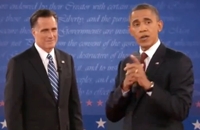The Purpose of Presidential Debates
27 Oct 2012
 Monday night's presidential foreign policy debate probably won't change the opinion of many voters. Proponents of President Barack Obama are still convinced that Mitt Romney is a fool and a liar. Proponents of former Gov. Romney have the same view of the president.
Monday night's presidential foreign policy debate probably won't change the opinion of many voters. Proponents of President Barack Obama are still convinced that Mitt Romney is a fool and a liar. Proponents of former Gov. Romney have the same view of the president.
Of course, this is normal in any American presidential race. Along with the eternal conviction that the party in power is destroying the country, we have regarded Abraham Lincoln, during the 1860 election, as a simple-minded country bumpkin with a touch of larceny; Franklin Roosevelt as a rich dilettante and socialist; and Dwight Eisenhower as a bumbling fool who is lazy and incapable of understanding the complexity of the world -- this about the man who, during World War II, led the most complex military coalition on the planet to victory.
We like to think that our politics have never been less civil than they are today. Given that Andrew Jackson's wife was accused of being a prostitute, Grover Cleveland was said to have illegitimate children and Lyndon Johnson faced the chant "Hey, hey, LBJ, how many kids did you kill today?" I will assert that the Obama-Romney campaign doesn't even register on the vilification scale.
The founders wouldn't have minded this culture of contempt for politicians. In founding the republic, their fundamental fear was that the power of the state would usurp the freedoms of the states and individuals. They purposefully created a political regime so complex that it is, in its normal state, immobilized. They would not have objected if professional politicians were also held in contempt as an additional protection. Ironically, while the founders opposed both political parties and professional politicians, preferring to imagine that learned men take time from their daily lives to make the sacrifice of service, many became full-time politicians and vilified one another. Thomas Jefferson's campaign said of John Adams that he had a "hideous hermaphroditical character, which has neither the force and firmness of a man, nor the gentleness and sensibility of a woman." Adams' campaign stated that Jefferson was "a mean-spirited, low-lived fellow, the son of a half-breed Indian squaw sired by a Virginia mulatto father." And Jefferson and Adams were friends. I would suggest suspending the idea that we have never had so vicious a politics.
Let me move to a more radical thought. Both Mitt Romney and Barack Obama are capable men, as well intentioned as ambitious men seeking power can be. Just as I doubt that Jefferson and Adams were as stupid and malicious as their campaigns tried to portray one another, the same can be said of Romney and Obama. I am not suggesting for a moment that the circus of accusations stop, however. To the contrary, seeing how one endures slander is an outstanding measure of a leader's character and an opportunity to learn how the candidate will react to the sorts of unreasonable and unfair conditions that the president is sure to encounter.
A president will face a world that does not wish the United States well in all cases and an opposition that will try anything, fair or foul, to make the president fail. A president who breaks down when he is mistreated -- as Edmund Muskie, a senator running for president in 1972, did over charges made against his wife -- is a non-starter. Muskie's campaign immediately collapsed, as it should have. A president who expects to be treated fairly is an immediate liability.
The true objective of debates


















